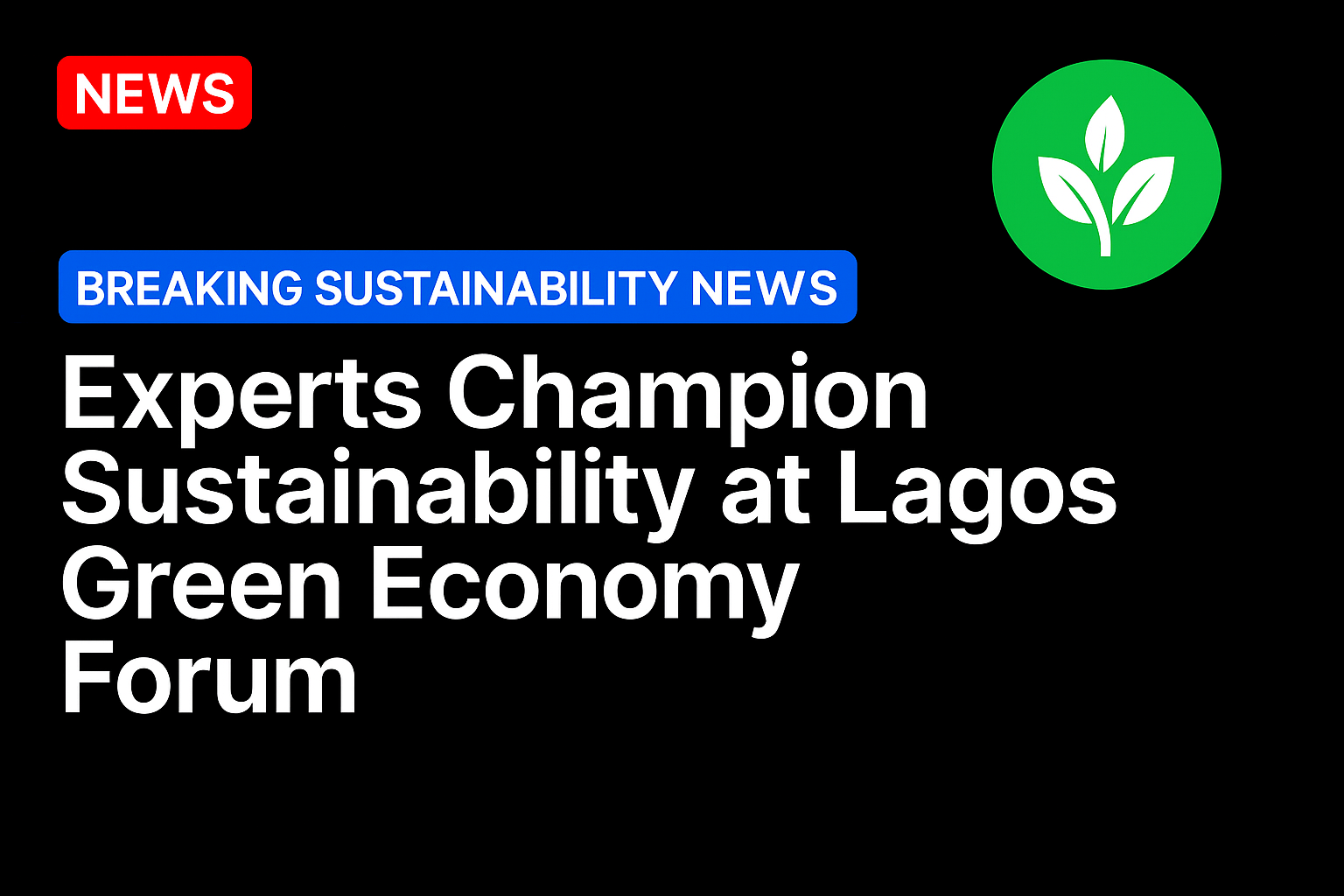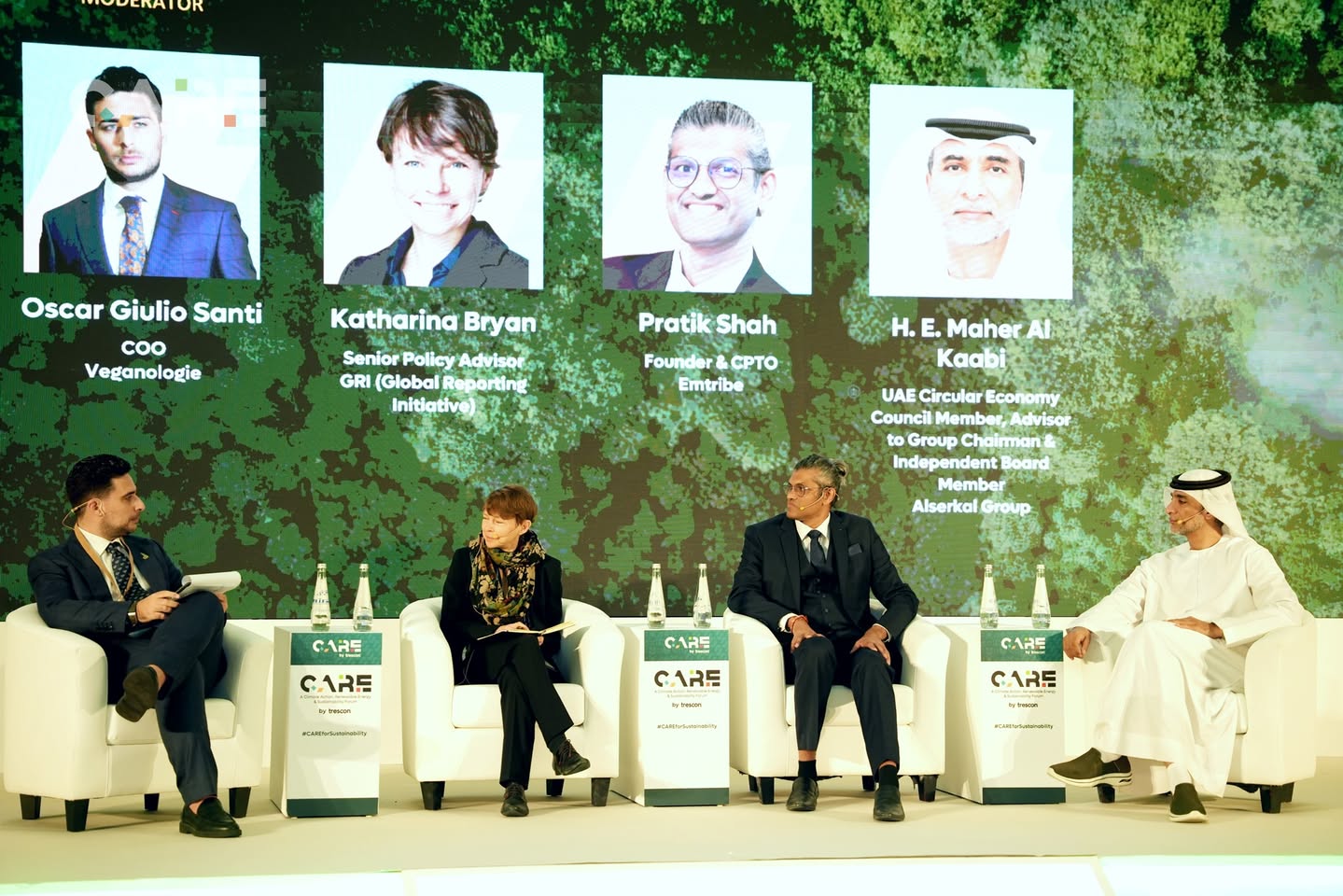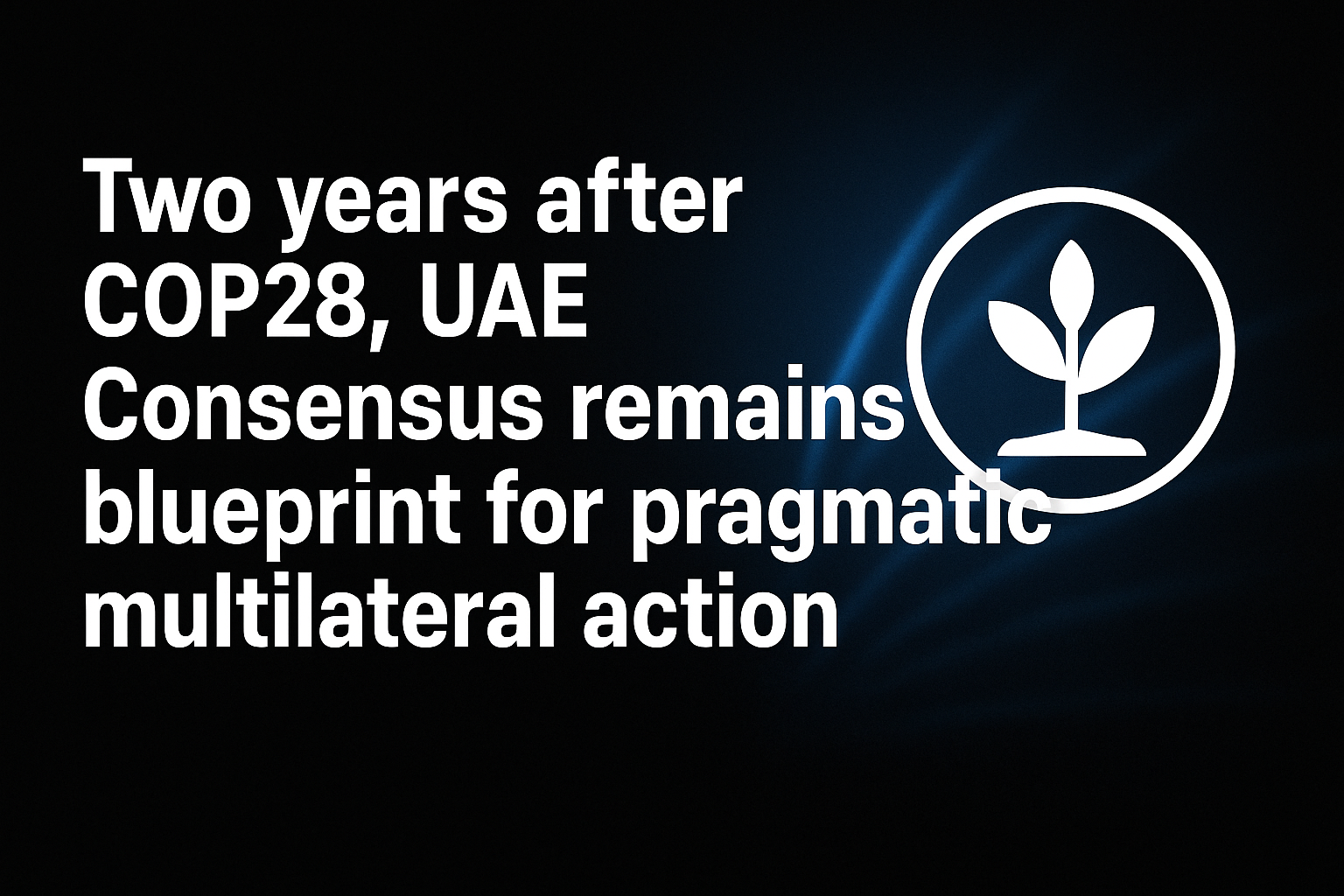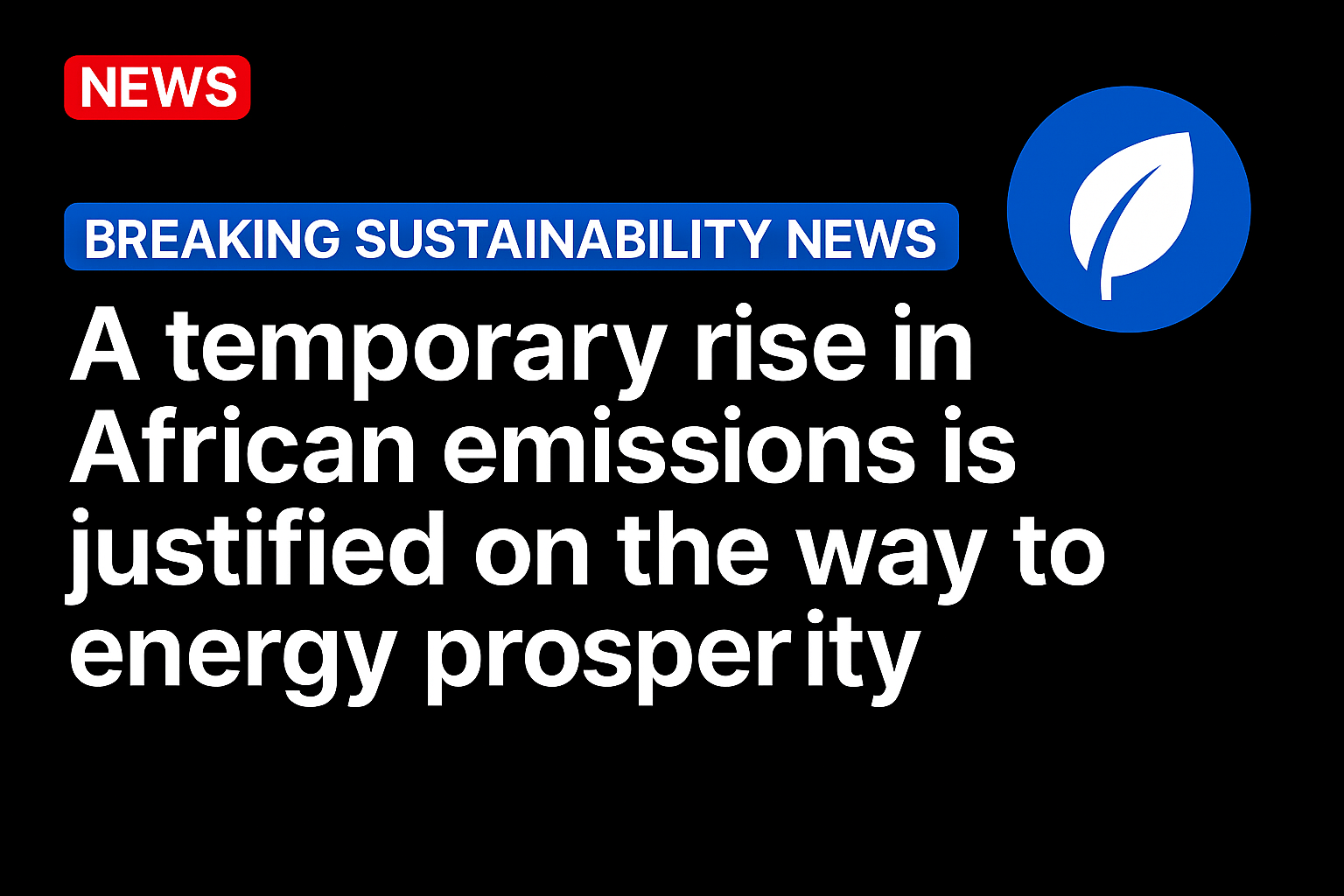Lagos State’s transition to a greener economy is gaining momentum, with female leaders from top corporations taking the lead and the state government beginning to record early wins from its plastic bag policy.
At the Lagos Green Economy Forum held on July 23, senior executives from MTN Nigeria, IHS Towers, TechnoServe, and other large organisations highlighted the role of corporate innovation in advancing sustainability.
The all-female panel also emphasised the urgent need to integrate Nigeria’s thousands of small and medium enterprises (SMEs) into the country’s green transition.
https://googleads.g.doubleclick.net/pagead/ads?gdpr=0&client=ca-pub-3871929244942399&output=html&h=280&adk=3259916396&adf=744648686&pi=t.aa~a.1209929155~i.7~rp.4&w=740&abgtt=6&fwrn=4&fwrnh=100&lmt=1753525484&num_ads=1&rafmt=1&armr=3&sem=mc&pwprc=8676808003&ad_type=text_image&format=740×280&url=https%3A%2F%2Fwww.nigeriacommunicationsweek.com.ng%2Fall-female-panel-drives-new-dialogue-on-green-growth-in-lagos%2F&fwr=0&pra=3&rh=185&rw=740&rpe=1&resp_fmts=3&wgl=1&fa=27&uach=WyJXaW5kb3dzIiwiMTAuMC4wIiwieDg2IiwiIiwiMTM4LjAuNzIwNC4xNjkiLG51bGwsMCxudWxsLCI2NCIsW1siTm90KUE7QnJhbmQiLCI4LjAuMC4wIl0sWyJDaHJvbWl1bSIsIjEzOC4wLjcyMDQuMTY5Il0sWyJHb29nbGUgQ2hyb21lIiwiMTM4LjAuNzIwNC4xNjkiXV0sMF0.&dt=1753525450684&bpp=2&bdt=29282&idt=2&shv=r20250723&mjsv=m202507220101&ptt=9&saldr=aa&abxe=1&cookie=ID%3Da6d71c1d65236eeb%3AT%3D1753525450%3ART%3D1753525450%3AS%3DALNI_MbTBR1GBbLJo2W8z1zRnJ9ocUyEMA&gpic=UID%3D0000116ef1a561a8%3AT%3D1753525450%3ART%3D1753525450%3AS%3DALNI_MZGOgnPnILOO0l2suobkOf-cOJWGw&eo_id_str=ID%3D40e7adfb77f4d62e%3AT%3D1753525450%3ART%3D1753525450%3AS%3DAA-AfjaPID_5mlcjYyEXvEHdCauO&prev_fmts=0x0%2C1905x919&nras=3&correlator=1698035286043&frm=20&pv=1&u_tz=240&u_his=1&u_h=1080&u_w=1920&u_ah=1040&u_aw=1920&u_cd=24&u_sd=1&dmc=8&adx=433&ady=1677&biw=1905&bih=919&scr_x=0&scr_y=0&eid=31093040%2C31093512%2C31093580%2C95362655%2C95365699%2C95366176%2C95366913%2C95366846%2C95359266%2C95367169&oid=2&pvsid=3701059226661465&tmod=1200761673&uas=0&nvt=1&ref=https%3A%2F%2Fwww.google.com%2F&fc=1408&brdim=0%2C0%2C0%2C0%2C1920%2C0%2C0%2C0%2C1920%2C919&vis=1&rsz=%7C%7Cs%7C&abl=NS&fu=128&bc=31&bz=0&td=1&tdf=2&psd=W251bGwsW251bGwsbnVsbCxudWxsLCJkZXByZWNhdGVkX2thbm9uIl0sbnVsbCwzXQ..&nt=1&pgls=CAEaBTYuOC4y&ifi=2&uci=a!2&btvi=1&fsb=1&dtd=33995
“We’re not just here to share strategies,” said Temilade Olabanji, Senior Manager, Sustainability and Shared Value, MTN Nigeria. “We are here to build local resilience. Our Project Zero is not only helping us cut emissions but also equipping our suppliers with the knowledge to do the same.”
MTN’s Project Zero aims for net-zero emissions by 2040, with a 50% reduction target by 2030. The company is already powering base stations and data centres with renewables, while training suppliers to understand carbon footprints and adopt circular practices. MTN has pledged that by 2026, 80% of its top suppliers will align with its sustainability goals.
Titilope Oguntuga, Director of Sustainability, IHS Towers, reinforced this approach, noting that the company’s Project Green is decarbonising its over 16,000 tower sites across Nigeria by switching to renewable energy. “Project Green is enabling all sites to run effectively with more renewable sources of energy rather than the typical fossil fuels,” she said. IHS also runs Clinic Without Walls, a free micro-health insurance scheme for underserved communities.
https://googleads.g.doubleclick.net/pagead/ads?gdpr=0&client=ca-pub-3871929244942399&output=html&h=280&adk=3259916396&adf=346981556&pi=t.aa~a.1209929155~i.10~rp.4&w=740&abgtt=6&fwrn=4&fwrnh=100&lmt=1753525484&num_ads=1&rafmt=1&armr=3&sem=mc&pwprc=8676808003&ad_type=text_image&format=740×280&url=https%3A%2F%2Fwww.nigeriacommunicationsweek.com.ng%2Fall-female-panel-drives-new-dialogue-on-green-growth-in-lagos%2F&fwr=0&pra=3&rh=185&rw=740&rpe=1&resp_fmts=3&wgl=1&fa=27&uach=WyJXaW5kb3dzIiwiMTAuMC4wIiwieDg2IiwiIiwiMTM4LjAuNzIwNC4xNjkiLG51bGwsMCxudWxsLCI2NCIsW1siTm90KUE7QnJhbmQiLCI4LjAuMC4wIl0sWyJDaHJvbWl1bSIsIjEzOC4wLjcyMDQuMTY5Il0sWyJHb29nbGUgQ2hyb21lIiwiMTM4LjAuNzIwNC4xNjkiXV0sMF0.&dt=1753525450692&bpp=1&bdt=29290&idt=1&shv=r20250723&mjsv=m202507220101&ptt=9&saldr=aa&abxe=1&cookie=ID%3Da6d71c1d65236eeb%3AT%3D1753525450%3ART%3D1753525450%3AS%3DALNI_MbTBR1GBbLJo2W8z1zRnJ9ocUyEMA&gpic=UID%3D0000116ef1a561a8%3AT%3D1753525450%3ART%3D1753525450%3AS%3DALNI_MZGOgnPnILOO0l2suobkOf-cOJWGw&eo_id_str=ID%3D40e7adfb77f4d62e%3AT%3D1753525450%3ART%3D1753525450%3AS%3DAA-AfjaPID_5mlcjYyEXvEHdCauO&prev_fmts=0x0%2C1905x919%2C740x280&nras=4&correlator=1698035286043&frm=20&pv=1&u_tz=240&u_his=1&u_h=1080&u_w=1920&u_ah=1040&u_aw=1920&u_cd=24&u_sd=1&dmc=8&adx=433&ady=2372&biw=1905&bih=919&scr_x=0&scr_y=0&eid=31093040%2C31093512%2C31093580%2C95362655%2C95365699%2C95366176%2C95366913%2C95366846%2C95359266%2C95367169&oid=2&pvsid=3701059226661465&tmod=1200761673&uas=0&nvt=1&ref=https%3A%2F%2Fwww.google.com%2F&fc=1408&brdim=0%2C0%2C0%2C0%2C1920%2C0%2C0%2C0%2C1920%2C919&vis=1&rsz=%7C%7Cs%7C&abl=NS&fu=128&bc=31&bz=0&td=1&tdf=2&psd=W251bGwsW251bGwsbnVsbCxudWxsLCJkZXByZWNhdGVkX2thbm9uIl0sbnVsbCwzXQ..&nt=1&pgls=CAEaBTYuOC4y&ifi=3&uci=a!3&btvi=2&fsb=1&dtd=34040
From the nonprofit sector, Juliet Ezeani, Senior Business Advisor of TechnoServe, explained how the organisation supports vendors through environmental impact assessments, sustainability training, and responsible procurement.“For all our projects, we look at how the project runs and especially how it affects the environment,” she said.
Meanwhile, the Lagos State Government provided an update on its green policy efforts, especially the plastic bag ban introduced two months ago.
“All of what we have done so far is towards making the economy of Lagos or the quality of life of the average Lagosian much better,” said Dr. Babatunde Ajayi, General Manager of the Lagos Environmental Protection Agency (LASEPA), who represented the Honourable Commissioner, Mr. Tokunbo Wahab.
https://googleads.g.doubleclick.net/pagead/ads?gdpr=0&client=ca-pub-3871929244942399&output=html&h=280&adk=3259916396&adf=2215483563&pi=t.aa~a.1209929155~i.13~rp.4&w=740&abgtt=6&fwrn=4&fwrnh=100&lmt=1753525484&num_ads=1&rafmt=1&armr=3&sem=mc&pwprc=8676808003&ad_type=text_image&format=740×280&url=https%3A%2F%2Fwww.nigeriacommunicationsweek.com.ng%2Fall-female-panel-drives-new-dialogue-on-green-growth-in-lagos%2F&fwr=0&pra=3&rh=185&rw=740&rpe=1&resp_fmts=3&wgl=1&fa=27&uach=WyJXaW5kb3dzIiwiMTAuMC4wIiwieDg2IiwiIiwiMTM4LjAuNzIwNC4xNjkiLG51bGwsMCxudWxsLCI2NCIsW1siTm90KUE7QnJhbmQiLCI4LjAuMC4wIl0sWyJDaHJvbWl1bSIsIjEzOC4wLjcyMDQuMTY5Il0sWyJHb29nbGUgQ2hyb21lIiwiMTM4LjAuNzIwNC4xNjkiXV0sMF0.&dt=1753525450697&bpp=1&bdt=29295&idt=0&shv=r20250723&mjsv=m202507220101&ptt=9&saldr=aa&abxe=1&cookie=ID%3Da6d71c1d65236eeb%3AT%3D1753525450%3ART%3D1753525450%3AS%3DALNI_MbTBR1GBbLJo2W8z1zRnJ9ocUyEMA&gpic=UID%3D0000116ef1a561a8%3AT%3D1753525450%3ART%3D1753525450%3AS%3DALNI_MZGOgnPnILOO0l2suobkOf-cOJWGw&eo_id_str=ID%3D40e7adfb77f4d62e%3AT%3D1753525450%3ART%3D1753525450%3AS%3DAA-AfjaPID_5mlcjYyEXvEHdCauO&prev_fmts=0x0%2C1905x919%2C740x280%2C740x280&nras=5&correlator=1698035286043&frm=20&pv=1&u_tz=240&u_his=1&u_h=1080&u_w=1920&u_ah=1040&u_aw=1920&u_cd=24&u_sd=1&dmc=8&adx=433&ady=2984&biw=1905&bih=919&scr_x=0&scr_y=0&eid=31093040%2C31093512%2C31093580%2C95362655%2C95365699%2C95366176%2C95366913%2C95366846%2C95359266%2C95367169&oid=2&pvsid=3701059226661465&tmod=1200761673&uas=0&nvt=1&ref=https%3A%2F%2Fwww.google.com%2F&fc=1408&brdim=0%2C0%2C0%2C0%2C1920%2C0%2C0%2C0%2C1920%2C919&vis=1&rsz=%7C%7Cs%7C&abl=NS&fu=128&bc=31&bz=0&td=1&tdf=2&psd=W251bGwsW251bGwsbnVsbCxudWxsLCJkZXByZWNhdGVkX2thbm9uIl0sbnVsbCwzXQ..&nt=1&pgls=CAEaBTYuOC4y&ifi=4&uci=a!4&btvi=3&fsb=1&dtd=34045
On the plastic bag ban, he added: “What that [the ban] has also done is to free up our drainage from the plastic waste. In some way, we have reduced flooding, reduced pollution, and reduced the headache and the cost of maintaining drainages and labourers.”
Dr. Ajayi emphasised that green transition is not just a compliance issue for SMEs but an economic opportunity. “It helps them drive their engines, their entire businesses in a more sustainable manner.”
As Lagos accounts for nearly 30% of Nigeria’s GDP, the increasing alignment between corporate leaders and public policy towards a greener economy is positioning the state as a model for inclusive, environmentally responsible development.
Source: nigeriacommunicationsweek.com.ng/




